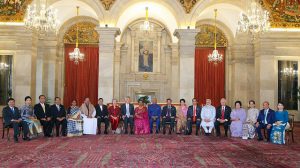
NEW DELHI: Amid China’s increasing economic and military stranglehold in East Asia, ASEAN countries have pitched for a bigger role for India in the Asia-Pacific region, with Prime Minister Narendra Modi putting maritime security on the forefront of the India-ASEAN agenda.
In his opening speech at the plenary of the special commemorative summit to mark the silver jubilee of India-ASEAN partnership, Mr Modi termed maritime cooperation as a key focus area for India and ASEAN in the Indo-Pacific region and underlined that maintaining freedom of navigation will remain critical in days to come.
Focus on maritime cooperation
Enhanced maritime cooperation also figured prominently during bilateral talks between Mr Modi and the leaders of six ASEAN countries, including Myanmar, Vietnam, the Philippines, Thailand, Singapore and Brunei on January 25.
In all these bilateral interactions, there was a refrain that there should be greater maritime cooperation in addressing traditional and non-traditional security challenges, Preeti Saran, Secretary (East) in India’s Ministry of External Affairs, told journalists in New Delhi.
Another refrain was that all the leaders with whom Mr Modi held talks conveyed that there is a potential for greater trade and investment given the dynamism of their economy and India’s dynamism, said Mrs Saran.
Forging a comprehensive and broad-based maritime partnership is expected to be the major outcome of the India-ASEAN summit.
Enhanced maritime cooperation has acquired an added salience in India-ASEAN equations in the backdrop of China’s perceived expansionist ambitions in South China Sea. Although China has emerged as the largest trading partner of all ASEAN countries, many of them are looking for a balancing power that can countervail China’s increasing assertiveness and see India, with its growing economy and naval muscle, in this role.
Symbolism & Strategy
The overarching thrust of the special summit in Delhi, which is being attended by all the 10 leaders of ASEAN countries, is to raise India’s profile in the region with a larger strategic vision to pitch India as a credible balancing force in the region. The 10 leaders of ASEAN countries are also be guests of honour at the Republic Day celebrations, a unique and unprecedented gesture by India that underscores the centrality of ASEAN region in its geopolitical calculus in the region.
Given its centuries-old civilizational and cultural linkages with ASEAN countries and expanding trade and investment, India has soft power advantage, but needs to upgrade its strategic and security role in the region to provide ASEAN countries a hedge against Chinese assertiveness. Given the current asymmetries in the engagement of India and China with ASEAN, New Delhi has to raise its game in the region and back declarations with concrete action and fast-track delivery of ongoing connectivity projects that could bring the two emerging regions closer in a web of co-prosperity.
Author Profile

- Manish Chand is Founder and Editor-in-Chief of India Writes Network (www.indiawrites.org) and India and World, a pioneering magazine focused on international affairs. He is CEO, Centre for Global India Insights, an India-based think tank focused on global affairs.
Latest entries
 India and the WorldFebruary 27, 2026Modi visit: India-Israel partnership enters a new era
India and the WorldFebruary 27, 2026Modi visit: India-Israel partnership enters a new era India and the WorldFebruary 24, 2026Unravelling Modi’s Israel journey: What to expect
India and the WorldFebruary 24, 2026Unravelling Modi’s Israel journey: What to expect India and the WorldFebruary 17, 2026South-by-South: Focus on people-centric solutions at India AI summit
India and the WorldFebruary 17, 2026South-by-South: Focus on people-centric solutions at India AI summit India and the WorldFebruary 7, 2026Modi hails interim India-US trade deal, Goyal says no concessions made on agriculture
India and the WorldFebruary 7, 2026Modi hails interim India-US trade deal, Goyal says no concessions made on agriculture







